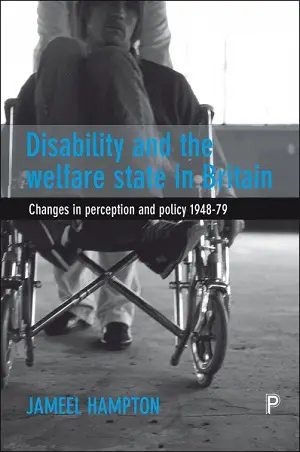
Disability and the welfare state through history: were we on the agenda?
The news is filled with stories of the current state of the welfare system. But what about the history of it? Who did it serve and were the rights of disabled people on the agenda? We hear from Jameel Hampton, who’s book Disability and the Welfare State in Britain: Changes in Perception and Policy, 1948-79 examines this issue.
While studying my BA and MA in modern history, and looking closely at the subject of disabled people and welfare in Britain, it became evident that disabled people are largely missing from historical information on the classic welfare state. Their absence began during the Second World War and ended during the economic crises of the middle and later 1970s.
I also became aware that, during the liberalisation of British society in the 1960s, groups such as Shelter and the Child Poverty Action Group, worked to reverse the welfare state’s exclusion of needy groups – but this didn’t include disabled people. So what groups represented them and how was disability perceived in political and public discourse?
Blind and deaf people had, for a long time, received special statutory provision, especially when it came to children and special education. Disabled ex-servicemen and those injured in an industrial accident had similar provision made for them in the classic welfare state settlement.
What, then, of disabled people with hereditary conditions and those whose acquired conditions? How did this group of disabled people, both large and unknown in number, fit with the idea of a ‘universal’ welfare state in benefits and services? And, if the classic welfare state meant the death of the Poor Law and the razing of the workhouse, which provided help for those in poverty, what new provisions were created to take their place for these people?
Finally, and crucially, how did both major parties view disability? How did these views change as time went on and how did policy develop under their respective governments of the period?
These questions led to my exploration of the topic of my University of Bristol doctoral thesis and, eventually, my book, Welfare State in Britain: Changes in Perception and Policy, 1948-79.
Delving into the history of the welfare state
Over the last 10 to 15 years historians have just started to discover the wealth of archived and other valuable materials to help in the study of disability in twentieth-century Britain. My doctoral thesis, which formed the core of my book, used scores of records at The National Archives.
I also used documents from the Conservative Party Archive (Bodleian Library), the Labour History Archive and Study Centre (Manchester), the British Library, and collections at the Universities of Essex and Sussex – all worth a read if you’re interested in this area of history.
I also drew a lot of information from the collections of the Disablement Income Group – one of the most powerful pressure groups in the 1960s and 1970s – and the Trades Unions Congress – a group fighting to change society for good.
I have no doubt and certainly hope that historians, as well as scholars and students of literature and the arts, will continue to engage increasingly with disability-focussed topics.
What history tells us about disabled people’s fight to be included
My research revealed that the classic welfare state seemed to promise universal health and welfare for all, but originally excluded millions of disabled people who didn’t fit into the categories of ex-servicemen or injured on the job.
With the ‘rediscovery of poverty’ in the 1960s, it was a commonly held belief that new and sweeping policies would result in the full inclusion of disabled people in the welfare state and society. This seemed to have been achieved with a national disability income in 1975. But, as it appeared just before the rolling back of the state provisions and a renewed focus on the free market and a competitive society in the 1980s, where the emphasis was put on people fending for themselves, it was eventually found to be ineffective.

My study and book was the first major analysis of the Disablement Income Group and the work of its leader, Megan du Boisson, who had multiple sclerosis. The self-proclaimed ‘disabled housewife’ discovered and sought to remedy paltry statutory benefits for disabled people.
It also provides the original analysis of the 1972-3 Thalidomide crisis and its impact on the government’s health services. Packed with information, the book details policy changes under every government in the period, and analyses changing ideas about the appropriate place of disabled people within the mixed economy of welfare: central and local government, formal voluntary organisations, and informal care via the efforts of families, friends, and communities.
With the emergence of the history of disability in Britain as a major area of research, I hope that my book will be a great tool for activists, academics and students, as well as those concerned more generally with disability and the politics of disability.
Personally, I want the book to help describe the struggle of millions of disabled people, to piece together their welfare during the period in history and suggest that hardship today can be partly improved through social policy.
I also hope that the book demonstrates that the welfare of disabled people has always been viewed through different lenses – cultural, legal, martial, moral, religious, social, and political. Finally, I hope it shows the efforts of outstanding individuals in politics who have fought for disabled people’s rights.
It highlights the work of people such as Jack Ashley, Britain’s first totally deaf Member of Parliament, Barbara Castle, who fought for disability benefits in a troubling economic time, and Alf Morris, the world’s first Minister for the Disabled.
Dr Jameel Hampton
You can buy Jameel’s book from the Policy Press website.
More from Disability Horizons…
- Disability discrimination: is it happening to you?
- The Anarchic Cripple: standing up for bigatory for everyone
- VIDEO: Disability-rights activist Judith Heurmann’s story on making change happen
Get in touch by messaging us on Facebook, tweeting us @DHorizons, emailing us at editor@disabilityhorizons.com or leaving your comments below.
One Comment